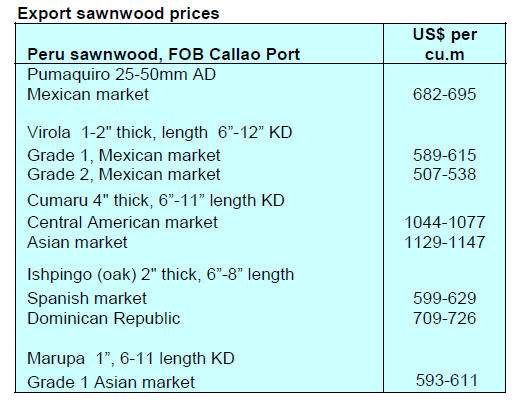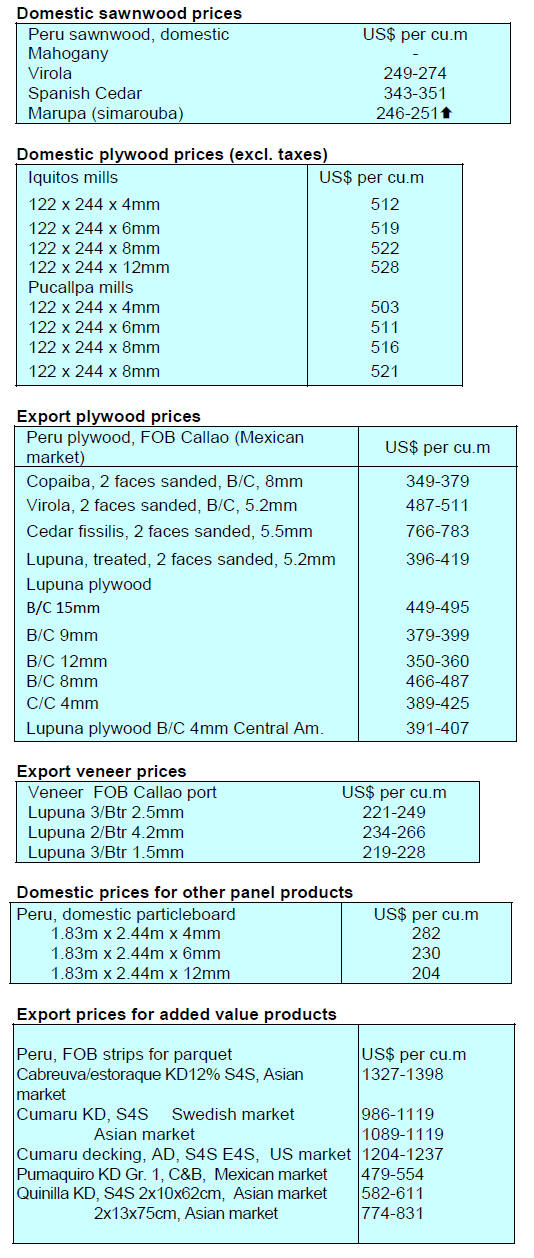4.
INDONESIA
Success at Atlanta Fair
Indonesian furniture and home decoration products sold
well during the Atlanta Summer Market Exhibition at the
Americas Mart Convention Center, Atlanta and have the
potential to secure contracts for around US$2.4 million.
Didi Sumedi, Director General, National Export
Development, Ministry of Trade, said products that
attracted buyers were toys, cypress wood products,
wooden utensils and wine and cigarette storage boxes.
The Head of the Indonesian Trade Promotion Center,
Bayu Nugroho, said governments support for participants
at this event is one of the government's efforts to increase
the value of Indonesia's exports to the US market.
See:
https://www.neraca.co.id/article/166240/furnitur-indonesiaberpotensi-transaksi-usd-24-juta-atlanta-summer-market
Programme to increase GHG absorption
The Environment and Forestry ministry has reported the
programme to boost absorption of greenhouse gas
emissions from the forestry and land use sector is being
conducted on a massive scale throughout the country.
This programme has become one of the most reliable ways
to combat climate change according to Secretary of the
ministry's Directorate General of Forestry and
Environmental Planning, Dr Hanif Faisol. The FoLU Net
Sink 2030 programme has been running across all regions
in Indonesia. The ministry has also conducted public
awareness campaigns on emission reductions.
See:
https://en.antaranews.com/news/241909/program-toincrease-absorption-of-ghg-emissions-conducted-massively
Indonesia invites Japan to increase forestry
investment
The Indonesian Ambassador to Japan, Heri Akhmadi, said
that Indonesia/Japan trade cooperation is very close
especially for wood products. He added that the
transformation of the energy sector in Japan that focuses
on bio-energy sources, such as wood pellets, opens up
opportunities for Indonesia.
An Indonesian delegation visited japan for the Indonesia-
Japan Forestry Investment Dialogue in early August and
the dialogue involved a number of Japanese forestry
companies.
See:
https://forestinsights.id/2022/08/04/indonesia-undangjepang-tingkatkan-investasi-kehutanan-dukung-folu-net-sink-2030/
Government - economic growth above five percent
The government will continue to maintain the economy so
it grows above five percent until the third quarter of 2022
despite the global turmoil and uncertainty. The
Coordinating Minister for the Economy, Airlangga
Hartarto, said that if the economy is able to grow above
five percent by the third quarter then the annual growth
target of 5-5.2 percent for this year will be achieved.
Minister Hartarto said his optimism was in line with
current economic growth driven by consumption,
investment and exports. On the supply side almost all
sectors reported growth in the first half of 2022.
See:
https://en.antaranews.com/news/242481/governmentmaintains-indonesias-economic-growth-at-above-five-percent
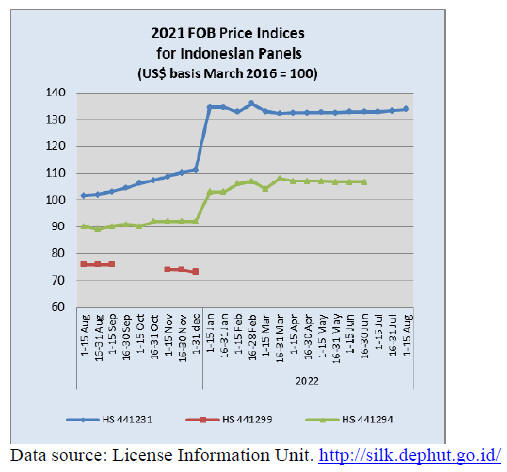
5.
MYANMAR
Trade Department release timber
export data
According to a recent release from the Trade Department
the earnings from the export of wood products between
October 2021 and May 2022 were US$108 million. The
figures for 2019-20 and 2020-21 were US$150 million and
US$122 million. It has been suggested that exports to EU
and USA are likely to decline while those to countries that
have not sanctioned Myanmar, such as India and China,
will rise.
See:
https://www.commerce.gov.mm/my/content/).
Changes to exchange regulations
On 9 August the Central Bank raised its official exchange
rate from 1,850 Kyats per dollar to 2,100 Kyats. At the
same time the Central Bank lowered the percent of earned
hard currency that must be converted from 100% to 65%.
Previously exporters had to convert the entire amount of
export earning into Myanmar Kyats at the fixed rate of
1,850 Kyats per dollar. This change has been welcomed by
exporters and manufactures.
As a result of the previous regulations manufacturers and
sawmillers were unable to import necessary material and
equipment as they had no access to hard currency.
Log supplies a challenge
Millers are experiencing a shortage of teak logs which fall
outside the dates when sanctions on the Myanma Timber
Enterprise (MTE) were implemented (logs held by the
MTE before 21 June 2021 are regarded as being
exempted).
MTE appears to be facing a challenge in transporting teak
and hardwood logs from the extraction sites to Yangon
because of security concerns due to activities of resistance
groups.
In related news a new regulation, effective at the end of
this year, will ban the export of large sized sawn timber
(baulks) which are regarded as raw material. Export to the
EU and USA are expected to decline.
Inconsistency in financial regulations create
confusion
The Central Bank of Myanmar raised its official exchange
rate in August. The domestic press has said erratic policy
shifts by the Central Bank have made the situation worse
for Myanmar’s economy. Last month, the Central Bank
ordered borrowers to suspend repayment of foreign loans
in order to conserve foreign currency reserves.
In April this year it ordered all businesses to convert all
foreign currency earnings into kyats within one day at the
official rate of 1,850 kyats, well below the informal
market rate of over 2,200 kyats. These actions have eroded
confidence in the kyat according to the local press.
See-
https://www.irrawaddy.com/news/burma/myanmar-juntasmoves-to-ease-currency-rules-wont-help-in-long-runexperts.html)
Fund established to develop rural areas
The Ministry of Planning and Finance set up a fund of
K400 billion from the National Natural Disaster
Management Fund in order to develop state economies
and to improve the lives of the people from regions and
states as well as promoting their economies. This was
reported by the Chairman of the State Administration
Council, Prime Minister Senior General Min Aung Hlaing.
See -
https://www.gnlm.com.mm/foreign-exchange-earned-fromexportation-will-be-spent-on-the-import-of-agricultural-inputsand-other-necessary-goods-senior-general/#article-title
)
Illegal timbers seized
The Anti-Illegal Trade Steering Committee has taken
action. An inspection team led by Myanmar Police Force
conducted raids on 4 and 5 August under the instructions
of the Mon State Anti-Illicit Trade Task Force and a team
led by the Yangon Region Forest Department carried out
inspections under the supervision of the Yangon Region
Anti-Illegal Trade Task Force.
A total of 6.1 tonnes of illegal timber worth K311,822 was
seized in the Oakkan forest reserve in Taikkgyi Township
of Yangon North District. In addition 17.8 tonnes of
illegal teak, iron-wood and other timbers worth
K8,566,372 were confiscated in the Bago, Thayawady and
Pyi districts.
See:
https://www.gnlm.com.mm/illegal-timbers-restricted-goodsconsumer-goods-and-vehicles-confiscated/
Crimes against women and children
The Independent Investigative Mechanism for
Myanmar (IIMM) has gathered evidence, outlined in
its Annual Report, that indicates “sexual and gender-based
crimes, including rape and other forms of sexual violence
and crimes against children have been perpetrated by
members of the security forces and armed groups”.
Crimes against women and children are amongst the
gravest international crimes but they are also historically
underreported and under-investigated,” said Nicholas
Koumjian, Head of the IIMM.
Meanwhile, with the consent of its information sources,
“IIMM is sharing relevant evidence to support
international justice proceedings currently underway at
the International Court of Justice (ICJ) and International
Criminal Court (ICC)”.
The IIMM was created by the UN Human Rights
Council in 2018 to collect and analyse evidence of the
most serious international crimes and other violations of
international law committed in Myanmar since 2011. It
aims to facilitate justice and accountability by preserving
and organizing evidence and preparing case files for use in
future prosecutions of those responsible in national,
regional and international courts.
See:
https://news.un.org/en/story/2022/08/1124302
6.
INDIA
Wholesale price indices
The Office of the Economic Adviser, Department for
Promotion of Industry and Internal Trade has published
wholesale price indices for June 2022. The annual rate of
inflation, based on the Wholesale Price Index (WPI) was
up 15.2% year on year in June 2022.
The high rate of inflation was mainly due to a rise in
prices of oil, food, crude petroleum and natural gas, metals
and chemicals.
The index for manufactured products declined in June. Out
of the 22 NIC two-digit groups for manufactured products,
14 saw increases in prices while 8 groups saw declines.
Price increases were reported for most wood products,
however, weak consumer sentiment drove down furniture
prices.
See:
https://eaindustry.nic.in/pdf_files/cmonthly.pdf
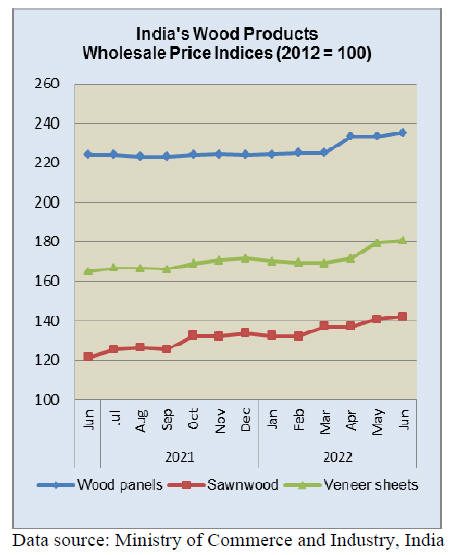
Relief for coastal shipping companies
To provide respite to waterway transportation from high
fuel prices the Ministry of Ports, Shipping and
Waterways has directed all major ports to exempt coastal
shipping operators from port and vessel charges for 6
months.
This is being done to offset the high cost of fuel. The
Minister also commented the rising fuel costs which is
making domestic roll-on/roll-off ferries too expensive. All
13 major ports will exempt all berth and vessel related
charges currently levied on the roll-on/roll-off passenger
ferries for the next 6 months will immediate effect, the
ministry said.
See: https://www.business-standard.com/article/currentaffairs/
no-port-vessel-related-charges-on-coastal-shipping-for-6-
months-govt-122072400646_1.html
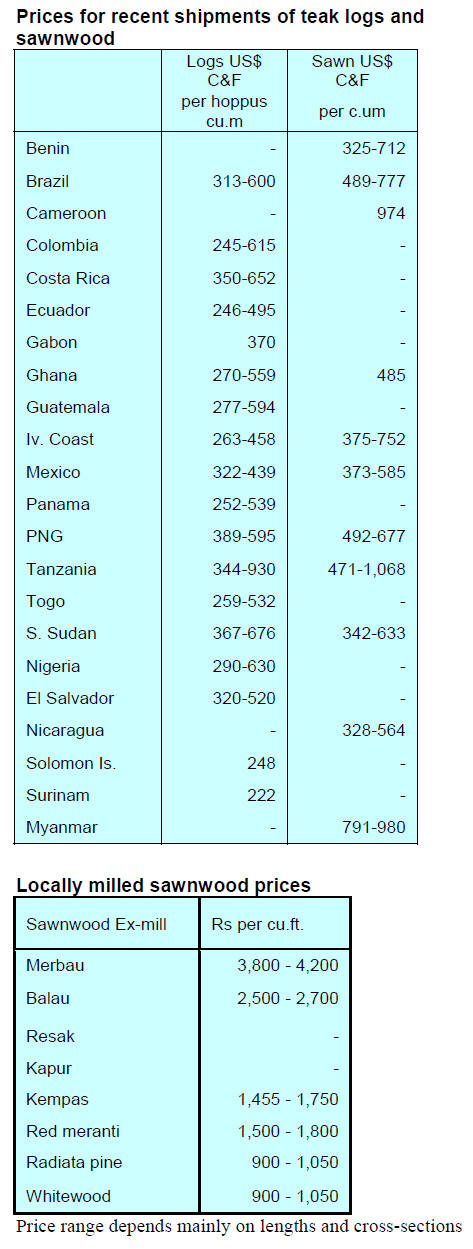
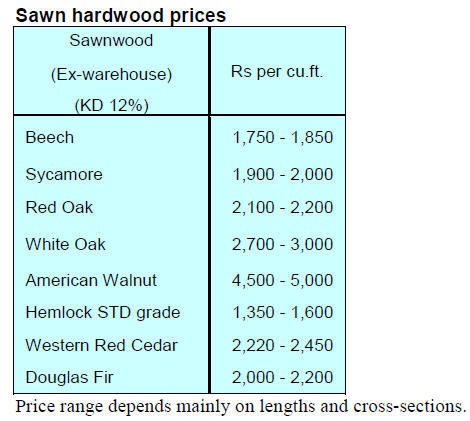
Plywood
In mid-July plywood manufacturers' associations in South
India unanimously agreed to raise plywood prices due to
the steep increase in resin prices but this has not been
adopted nationwide.
See:
https://www.plyreporter.com/article/93217/south-basedplywood-associations-raise-plywood-prices-by-50-paisa-per-sqftper-glue-line
Please note plywood prices are now shown below free of
local taxes.
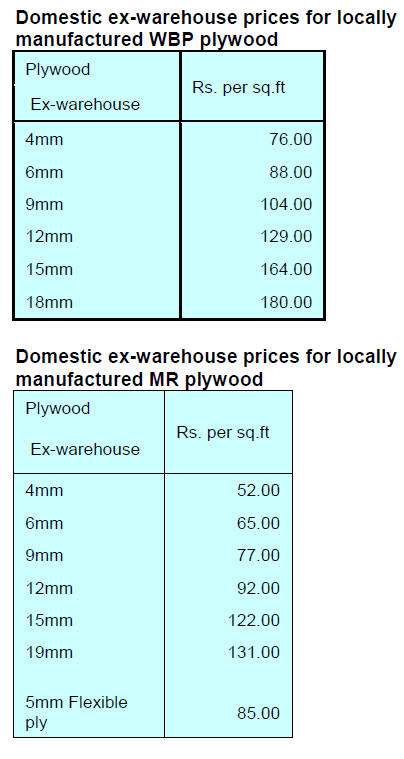
Forests are forests –Supreme Court
A recent Supreme Court ruling on the Aravalli forests case
is a decisive win for forest conservation, environmental
wellbeing and sustainable development. The court made it
clear that the protection accorded to forests by law cannot
be limited to only those areas recognised in the Indian
Forest Act, 1927.
The implications of the ruling are far wider than protection
of one small forest. This ruling comes at a time when
biodiversity loss has emerged as a major challenge with
substantial economic implications.
The court rules that the Aravalli forests were legally
required to be regarded as forests and that central
government permission is required to allow any change of
uses.
Source:
https://economictimes.indiatimes.com/opinion/eteditorial/not-missing-thelaw-for-thetrees/articleshow/93060842.cms
7.
VIETNAM
Wood and Wood Products (W&WP) Trade Highlights
Vietnam's W&WP exports to South Korea in July 2022
reached US$76.4 million, down 5.8% compared to July
2021. In the first 7 months of 2022 W&WP exports to
Korean were estimated at US$606.6 million, up 13% over
the same period in 2021.
Vietnam's exports of office furniture in July 2022 reached
US$33.1 million, down 34% compared to June 2021. In
general, over the first 6 months of 2022, exports of office
furniture were worth US$190.1 million, down 28.3% over
the same period in 2021.
Vietnam's imports of padauk in July 2022 accounted to
8,800d cu.m, worth US$3.8 million, down 30% in volume
and 45% in value year on year.
Over the first 7 months of 2022 imports of padauk are
estimated at 79,600 cu.m, worth US$35.3 million, down
26% in volume and 21% in value over the same period in
2021.
Over the first 7 months of 2022 exports of handicrafts are
estimated at US$150.53 million, up 5.1% over the same
period in 2021.
Vietnam's wood industry urged to seek new
opportunities in UK
While many products exported to the UK enjoyed strong
increases thanks to the UK-Vietnam Free Trade
Agreement (UKVFTA), Vietnam’s timber industry is
facing difficulties in expanding in this market and this
requires manufacturers and exporters to change their
business strategies.
Vietnam’s wood industry is seeing declining international
sales.
Exports in July are estimated at US$1.41 billion, down
5.5% against June and down 1.6% year-on-year according
to a report of the General Department of Forestry under
the Ministry of Agriculture and Rural Development
(MARD). This was the second month that the export of
wood and timber products decelerated.
Earlier, figures from the General Department of Customs
showed exports of wood and wood products reached
US$1.4 billion in June, down nearly 11% year-on-year.
Declining export orders
According to market insiders the wood industry will face a
serious challenge due to a decrease in export orders in the
latter half of this year.
A quick survey of 52 timber businesses conducted by the
Vietnam Timber and Forest Products Association
(Vifores) in collaboration with Forest Trends showed that
most companies witnessed decreasing exports to the US,
EU and UK markets.
Thirty-three out of 45 firms exporting to the US said their
revenues decreased by nearly 40% compared to the first
months of this year. A similar trend is seen in the EU and
the UK with two-thirds of the surveyed enterprises
reporting revenue drops of over 41%.
Moreover, about 71% of businesses said that orders will
continue to decline towards the end of the year. Under the
current market situation, 44% of businesses expect their
revenues will fall by about 44% for the whole year.
Vietnam's wood industry is integrating deeply with
international markets so high inflation and tightening
credit policies in response to rising inflation in major
markets are driving down demand.
New opportunities in the UK
W&WP export to the UK enjoyed an increase of 14% to
US$72 million in the first three months of 2022 but sales
to this market are also declining as consumers are
tightening their spending.
In June the value of exports declined 38% year-on-year to
US$16.3 million and in the first half the rate of reduction
was 7.7% to US$135.5 million.
Like other parts of the world, inflation in the UK hit a 40-
year high in June as food and energy prices continued to
soar, worsening the country’s historic cost-of-living crisis.
The Bank of England has implemented five consecutive
25 basis point rate hikes to cool high inflation and is
considering a 50 basis point hike at its August policy
meeting.
According to David Hopkins, chief executive of ‘Timber
Development UK’, the UK’s imports of wood and wood
products rose in the first quarter as merchants start to
rebuild stocks after the winter.
The UK’s economy is now struggling with high inflation,
high interest rates and big logistics challenges due to
Brexit and the Russian invasion of Ukraine.
So far, Vietnam’s predominant timber export to the UK is
furniture but Hopkins sees another opportunity for
Vietnamese exporters in niche areas such as plywood.
On furniture products, Hopkins said demand is expected to
decline in the next two years after a boom in housing
repair and maintenance during the pandemic before it can
bounce back. This trend will likely happen in the US and
the EU which are also suffering from high costs of living.
To better compete and expand sales in the UK, Hopkins
suggested Vietnamese manufacturers and exporters invest
in marketing and promotion to enhance awareness among
UK consumers about Vietnamese products.
The concepts of legality and sustainability are important
for consumers in the UK and are backed up by legislation.
See:
https://en.vietnamplus.vn/vietnams-timber-industry-urgedto-seek-new-opportunities-in-uk/234961.vnp
Exports of wood and forest products down for 2nd
consecutive month
According to a report by the General Department of
Forestry, Ministry of Agriculture and Rural Development,
the country’s export value of wood and forest products in
July of 2022 was estimated at US$1.41 billion, the second
month that the value of exports of wood and forest
products fell.
In general, the export value of wood and forest products in
the first 7 months of 2022 was estimated at US$10.42
billion, up by 1.3% over the same period of 2021. Exports
of wood and wood products alone reached US$9.72
billion, an increase of 1.2%; of which, the exports of wood
chips reached US$1.4 billion, up by 30%, the exports of
wood pellets reached US$0.45 billion, up by 79%, the
exports of all kinds of panel products reached US$0.91
billion, up by 22%, the export of wood products reached
US$6.97 billion down by 7% and the exports of nontimber
forest products reached US$0.7 billion, up by
2.6%.
Regarding the markets, in the first 7 months of 2022,
timber and forest products were exported to 110 countries
and territories, of which, the US, Japan, China, EU and
South Korea continued to be the main export markets.
The total exports to those 5 markets were estimated at
US$9.38 billion accounting for 90% of the total export
value of the country.
Exports to the US market reached over US$5.84 billion,
down by 5% over the same period of 2021, of which, the
exports of wood and wood products reached US$5.58
billion, down by 51%. Exports of non-timber forest
products reached US$0.25 billion, down by 0.6%.
Exports to the Japanese market reached US$1.04 billion,
up by 19% over the same period of 2021 of which exports
of wood and wood products reached US$999 million, up
by 20% and the exports of non-timber forest products
reached US$36 million, down by 2%.
Exports to the Chinese market reached US$1.161 billion,
up by 24% over the same period of 2021.
The country’s exports of wood and wood products to
China reached US$1.15 billion, up by 23%; while the
exports of non-timber forest products reached US$15
million, up by 164.2 percent.
Exports to the EU market reached US$726 million, up by
1% over the same period of 2021, of which, exports of
wood and wood products reached US$549 million, down
by 2% and the exports of non-timber forest products
reached US$177 million, up by 11%.
According to the Import-Export Department, Ministry of
Industry and Trade, the United States was the largest
export market of Vietnam's wood and wood products.
However, the decrease in export value of wood and wood
products to this important market has affected the export
activities of the whole industry.
The US is the main export market for the wood industry so
the decrease in exports hinders the growth of wood and
wood products export sector.
Exports of wood and wood products in the second half of
2022 may face many challenges both in terms of the
market and the supply chain, when the world inflation is
high, causing the purchasing power to decrease and the
transportation costs to increase.
According to Vietnam Timber and Forest product
Association, exports of wood and forest products in the
last months of the year may continue to face difficulties
due to the high price of production materials and products;
countries tighten credit policies because inflation tends to
increase, leading to a sharp decrease in consumer demand.
In addition, the wood industry is also facing the US DOC's
initiation of an investigation into wooden cabinets and
dressing tables.
In the context that the imports of raw materials from
European markets decreased sharply, specifically the
imports from Germany decreased by 2.2%, from France
decreased by 6.9%, from Italy decreased by 10.1%, from
Sweden decreased by 42.1% due to the influence of the
Russian invasion of Ukrainian leading to transportation
difficulties.
Imports of raw materials from some countries increased
sharply such as from Russia, Finland, and Belgium due to
the need to find alternative sources of raw materials due
to reduced supply in other markets.
The supply of raw materials from domestically planted
forest wood is still sufficient to meet production needs.
Currently, due to the increased demand for woodchips and
pellets, prices have risen by over 30% so the forest owners
tend to cut young forests (3-4 years old plantations),
leading to the risk of shortage of wood materials for
processing all kinds of other wood products.
In order to deal with the challenges ahead the General
Department of Forestry has recommended enterprises
actively develop production and business plans; promptly
respond to market fluctuations; strictly comply with
regulations on records of forest product origin and other
relevant regulations in timber and forest product
production and trading activities.
International wood fair opens in Binh Duong
More than 100 Vietnamese and foreign firms showed
advanced wood processing technologies, machinery and
raw materials at the 2022 Vietnam Binh Duong Furniture
Association (BIFA) Wood exhibition which opened in
southern Binh Duong province on 8 August.
See:https://en.vietnamplus.vn/international-wood-fairopens-in-binh-duong/235276.vnp
This biennial trade show is expected to unlock possibilities
for local and foreign companies looking to tap into
Vietnam’s potential. With its plentiful labour and
entrepreneurs and excellent connectivity with key timber
areas in the southeastern and Central Highlands regions,
Binh Duong claims a favourable business environment.
8. BRAZIL
Partnership boost for furniture
sector
The Project for Development, Competitiveness and
Integration of the Furniture Industry (Projeto de
Desenvolvimento, Competitividade e Integração da
Indústria do Mobiliário - PCDIMOB), a partnership
between the Brazilian Furniture Industry Association
(Abimóvel) and the Brazilian Micro and Small Business
Support Service (SEBRAE) intends to involve more than
200 small businesses in an initiative to combine efforts
and resources for the development of competitiveness,
productivity and integration of micro and small companies
in the furniture sector.
In eight states SEBRAE has confirmed particpants from
Pará, in the North, Piauí and Sergipe, in the Northeast, Rio
de Janeiro, in the Southeast Paraná, Santa Catarina and
Rio Grande do Sul, in the South and Distrito Federal, in
the Midwest.
PDCIMOB has identified five strategic objectives:
management excellence; strategic intelligence and trade
promotion; innovation; competitiveness and productivity
and networking.
In order to achieve the objectives strategies will be
developed on Sectoral and Digital Intelligence,
Competitiveness Improvement and Commercial closeness.
As a result it is expected that small businesses will
increase production and income and achieve a 30% jump
in innovation.
See:
https://www.moveisdevalor.com.br/portal/abimovel-esebrae-firmam-parceria-para-fortalecer--setor
Public hearing on forest concessions
The Ministry of Agriculture opened a public hearing in
July on concessions in the national forests of Jatuarana,
Pau Rosa and Gleba Castanho all within the Amazon
region and totalling 885,000 hectares.
The consultation aimed to gather information, feedback
and suggestions from the public and was coordinated by
the Brazilian Forest Service (SFB).
A forest concession allows sustainable harvesting of only
four to six trees per hectare and further harvesting can
only be undertaken after 25 to 35 years to allow for natural
regeneration.
See:
https://amazonia.org.br/consulta-publica-sobre-concessoesde-tres-florestas-vai-ate-sexta/
Abimad, US$8 million in business is possible
A furniture fair promoted by the Brazilian Associação
Brasileira das Indústrias de Móveis de Alta Decoração
(Abimad - Association of High Decoration Furniture
Industries) brought together a group of 60 foreign buyers
from countries such as Saudi Arabia, South Africa, the
United States, Panama, the Dominican Republic,
Argentina, Chile and Uruguay. It has been estimated that
Abimad may have generated about US$8 million in
business.
Brazilian furniture exports grew 42% in the past 12
months according to IEMI (Market Intelligence) in
partnership with the Brazilian Trade and Investment
Promotion Agency (Apex-Brazil).
In March alone Brazil exported about US$71.6 million in
furniture and mattresses. In the first quarter of the year the
performance was 8.8% higher compared to the same
period in 2021.
See:
https://valor.globo.com/patrocinado/imoveis-devalor/noticia/2022/07/29/estrangeiros-impulsionam-setormoveleiro-nacional.ghtml
Higher exports to the United States
The furniture trade between Brazil and the United States
registered a record in the first half of 2022. The US is
currently responsible for importing about 38% of Brazilian
furniture destined for the international market according to
the Brazilian Association of Furniture Industries
(ABIMÓVEL).
Furthermore, the trade between the two countries
registered US$42.7 billion in the first six months of 2022
according to the Brazilian-American Chamber of
Commerce.
This corresponds to an increase of 43% compared to the
first half of last year. Brazilian exports to the United States
increased by 32% this year.
The Brazilian Furniture Project, an initiative of
ABIMÓVEL and ApexBrasil (Brazilian Agency for the
Promotion of Exports and Investments), supported the
participation of 24 Brazilian companies in business rounds
in New York in May 2022.
Imports of American products to Brazil also increased and
the difference between imports and exports between the
countries resulted in a deficit of US$7.4 billion for Brazil,
the highest ever recorded.
See:
https://setormoveleiro.com.br/exportacoes-brasileiras-paraos-estados-unidos-crescem-em-niveis-historicos-em-2022/
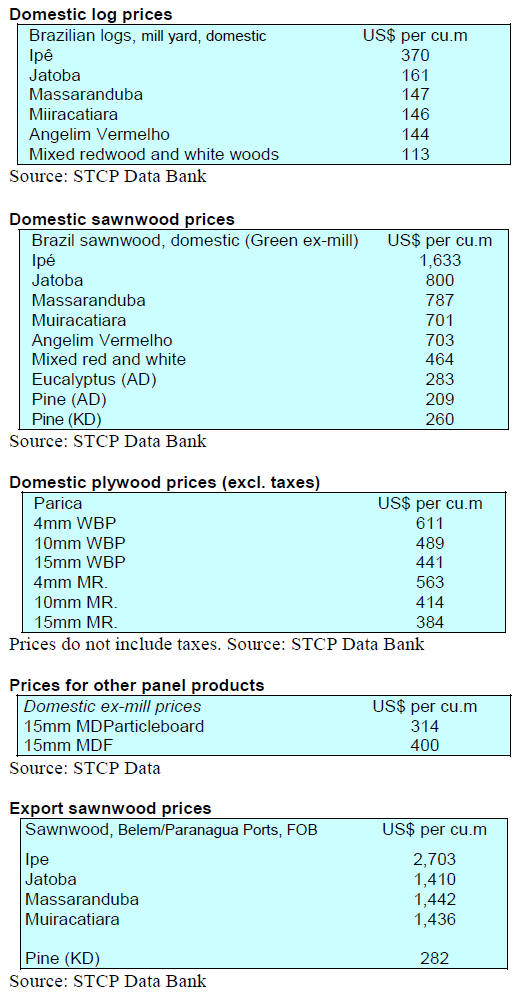
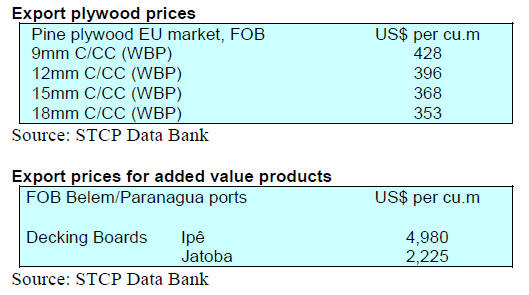
9. PERU
Plantations to substitute for
imports
The Executive Director of the National Forest and
Wildlife Service (Serfor), Nelly Paredes, highlighted the
experience of the Agrarian Workers' Cooperative
Atahualpa Jerusalem, better known as "Granja Porcón",
which has successfully established plantations.
She explained that the aim of Serfor is to promote
commercial forest plantations and agroforestry systems. In
2021 Peru imported wood products valued at around
US$1.1 million and some of these products can be
substituted by domestic production using plantation
timbers as raw material.
Shipments of veneer and plywood recovering
Exports of veneers and plywood in the first five months of
this year totalled US$1.21 million, a rise of 5.2%
compared to the same period in 2021, however, the total
did not reach the level seen in earlier years according to
the Management of Services and Extractive Industries
division of the Association of Exporters (ADEX).
In the past ten years (January-May period) the best
performance was in 2015 when shipments amounted to
US$7.85 million. In subsequent years (January-May),
there were constant declines to US$4.65 million (2016),
US$3.98 million (2017), US$3.14 million(2018), US$1.15
million (2019) and US$0.8 million (2020). These latest
figures indicate recovery is possible.
The main destination in the January-May 2022 period was
Mexico (US$1.18 million), or about 97% of all shipments
and up 9% compared to the same period in 2021.The most
outstanding export product was plywood at US$0.95
million, followed by walnut wood veneers, container
floors and shihuahuaco wood profiles.
Of the total timber exports (US$66.5 million, in the first
five months of the year) veneers and plywood represented
just 2% being surpassed by semi-manufactured products,
sawn wood, construction products, furniture and parts and
firewood and charcoal.
Guidelines to extend validity of forest concessions
Serfor has approved guidelines for the extension of the
validity of forest concession contracts (including timber
and non-timber) and wildlife concessions for five-years.
Through these guidelines the procedures are disclosed
according to the provisions of the Forestry and Wildlife
Law and its regulations and its purpose is to provide a
broad planning horizon for the concessions; in the case of
forestry, 40 years and for wildlife, 25 years.
Concession contracts can be extended every five years if
one of two conditions are met:
If it is recommended by the five-yearly audit
report carried out by the Supervision Agency for
Forest Resources and Wild Fauna (OSINFOR) to
the concession.
The concession has a current voluntary forest or
wildlife certificate.
With the approval of these guidelines the aim is to
encourage concessions holders that perform well and to
demonstrate to others that efforts to achieve a good
performance will be recognised.
See guideline:
https://www.gob.pe/institucion/serfor/normaslegales/3328020-d000175-2022-midagri-serfor-de
Serfor and Hungarian Research Institute cooperation
In early August the Executive Director of the Serfor and
the Director General of the Hungarian Forest Research
Institute (ERTI), Attila Borovics, expressed their
commitment to work together for the forest management
of the Amazon forests.
The head of Serfor explained that they will seek to sign a
cooperation agreement where the main topics of interest of
both institutions will be established related to innovation,
research and management of the resources of the Amazon
forests in order to guarantee their conservation.
ERTI, home to Hungarian forestry research since 1898,
has experience in the fields of forest management and the
agroforestry sector as well as working with Latin
American countries.
